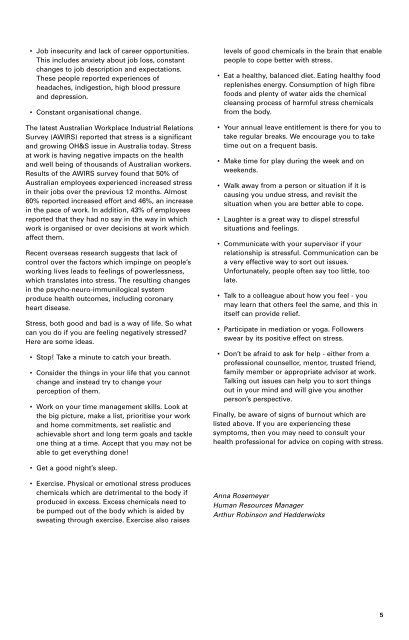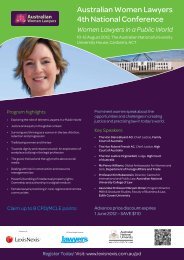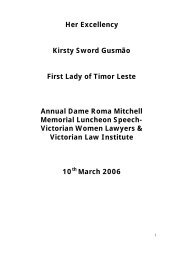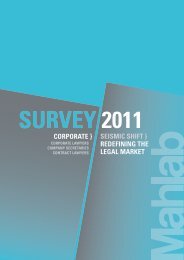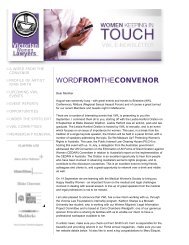Portia - Victorian Women Lawyers
Portia - Victorian Women Lawyers
Portia - Victorian Women Lawyers
Create successful ePaper yourself
Turn your PDF publications into a flip-book with our unique Google optimized e-Paper software.
• Job insecurity and lack of career opportunities.<br />
This includes anxiety about job loss, constant<br />
changes to job description and expectations.<br />
These people reported experiences of<br />
headaches, indigestion, high blood pressure<br />
and depression.<br />
• Constant organisational change.<br />
The latest Australian Workplace Industrial Relations<br />
Survey (AWIRS) reported that stress is a significant<br />
and growing OH&S issue in Australia today. Stress<br />
at work is having negative impacts on the health<br />
and well being of thousands of Australian workers.<br />
Results of the AWIRS survey found that 50% of<br />
Australian employees experienced increased stress<br />
in their jobs over the previous 12 months. Almost<br />
60% reported increased effort and 46%, an increase<br />
in the pace of work. In addition, 43% of employees<br />
reported that they had no say in the way in which<br />
work is organised or over decisions at work which<br />
affect them.<br />
Recent overseas research suggests that lack of<br />
control over the factors which impinge on people’s<br />
working lives leads to feelings of powerlessness,<br />
which translates into stress. The resulting changes<br />
in the psycho-neuro-immunilogical system<br />
produce health outcomes, including coronary<br />
heart disease.<br />
Stress, both good and bad is a way of life. So what<br />
can you do if you are feeling negatively stressed?<br />
Here are some ideas.<br />
• Stop! Take a minute to catch your breath.<br />
• Consider the things in your life that you cannot<br />
change and instead try to change your<br />
perception of them.<br />
• Work on your time management skills. Look at<br />
the big picture, make a list, prioritise your work<br />
and home commitments, set realistic and<br />
achievable short and long term goals and tackle<br />
one thing at a time. Accept that you may not be<br />
able to get everything done!<br />
levels of good chemicals in the brain that enable<br />
people to cope better with stress.<br />
• Eat a healthy, balanced diet. Eating healthy food<br />
replenishes energy. Consumption of high fibre<br />
foods and plenty of water aids the chemical<br />
cleansing process of harmful stress chemicals<br />
from the body.<br />
• Your annual leave entitlement is there for you to<br />
take regular breaks. We encourage you to take<br />
time out on a frequent basis.<br />
• Make time for play during the week and on<br />
weekends.<br />
• Walk away from a person or situation if it is<br />
causing you undue stress, and revisit the<br />
situation when you are better able to cope.<br />
• Laughter is a great way to dispel stressful<br />
situations and feelings.<br />
• Communicate with your supervisor if your<br />
relationship is stressful. Communication can be<br />
a very effective way to sort out issues.<br />
Unfortunately, people often say too little, too<br />
late.<br />
• Talk to a colleague about how you feel - you<br />
may learn that others feel the same, and this in<br />
itself can provide relief.<br />
• Participate in mediation or yoga. Followers<br />
swear by its positive effect on stress.<br />
• Don’t be afraid to ask for help - either from a<br />
professional counsellor, mentor, trusted friend,<br />
family member or appropriate advisor at work.<br />
Talking out issues can help you to sort things<br />
out in your mind and will give you another<br />
person’s perspective.<br />
Finally, be aware of signs of burnout which are<br />
listed above. If you are experiencing these<br />
symptoms, then you may need to consult your<br />
health professional for advice on coping with stress.<br />
• Get a good night’s sleep.<br />
• Exercise. Physical or emotional stress produces<br />
chemicals which are detrimental to the body if<br />
produced in excess. Excess chemicals need to<br />
be pumped out of the body which is aided by<br />
sweating through exercise. Exercise also raises<br />
Anna Rosemeyer<br />
Human Resources Manager<br />
Arthur Robinson and Hedderwicks<br />
5


